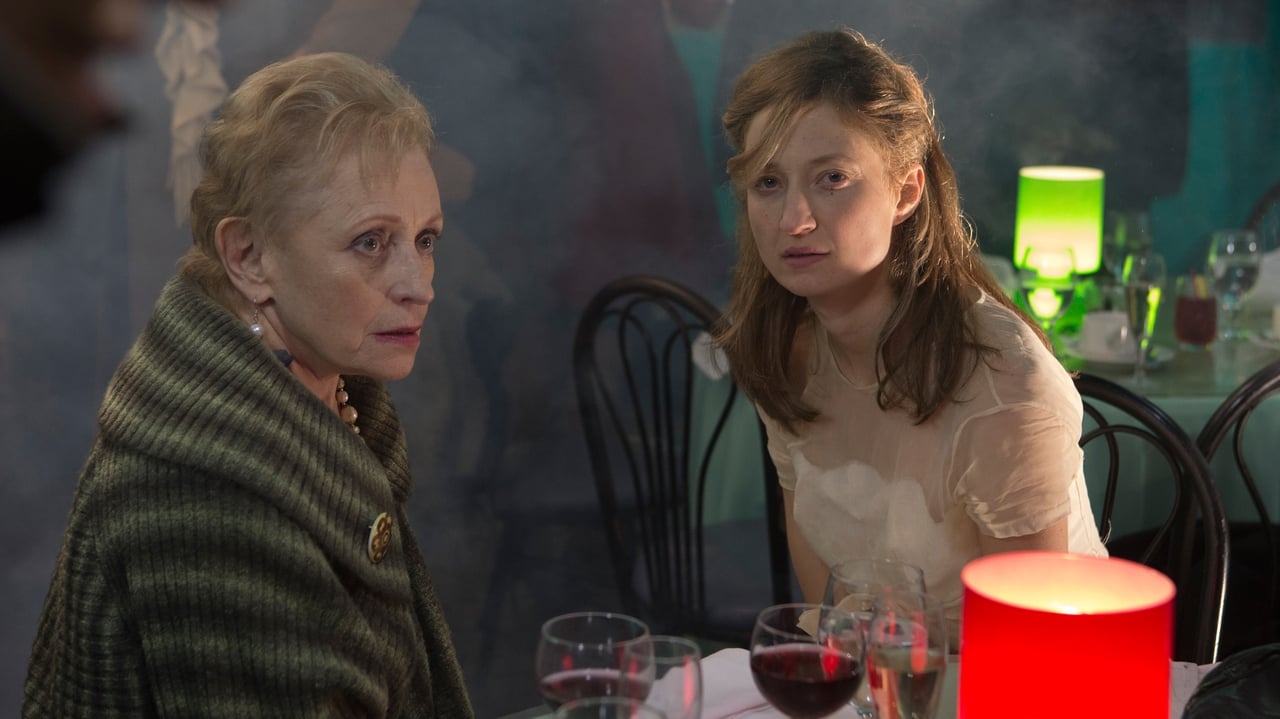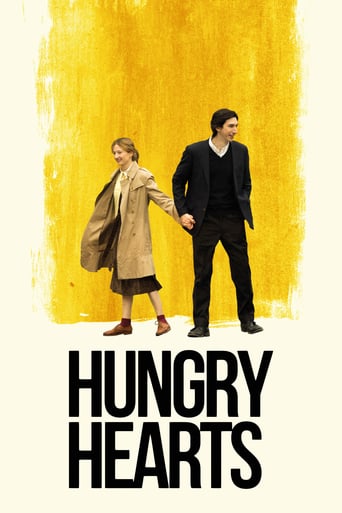Solemplex
To me, this movie is perfection.
Ceticultsot
Beautiful, moving film.
Taraparain
Tells a fascinating and unsettling true story, and does so well, without pretending to have all the answers.
Janis
One of the most extraordinary films you will see this year. Take that as you want.
S. Felton
The subject line is the exact opposite of the last movie review I wrote here, and I hadn't even seen this awful movie. As I've gotten older I've come to like the expression, "if you can't say something good, don't say anything," but this movie is so bad I've got to add my review to the few negative ones here.The beginning of the movie is in fact one of the better scenes, and it's stupid, and implausible for numerous reasons. Don't tell me two bathroom doors are going to suddenly become inoperable, it's just not believable.The movie goes downhill from there. The couple who meet in the weird bathroom scene get married and have a child, and I could already see problems with the script, but you never know. In fact, from the point they have the child the movie becomes an unmitigated disaster. She is very mentally ill and has "New Age" ideas about how to raise the child. I am not saying that the two are related, though maybe to the writer they are in some way. Whatever, her ideas are not working, and the child is not developing properly, and it's more than just that it's too small. The husband (Adam Driver performs quite well in his role, somehow) finally has enough of it and has to sneak the baby out to a doctor, who tells him the baby is in trouble. The mother is not only very mentally ill, but also quite stubborn: it's going to be her way, and only her way. Sometimes when told the truth about the baby or given advice she simply acts like a deaf mute and says nothing. Other times she repeats the same mantras she believes, like some kind of robot. Her face constantly show misery and she's always sullen. When the husband talks to her with kindness and obvious affection, she is often rude and picks fights.I am not an expert on these things, but to me it was obvious that the actress didn't like her character. Maybe a more skilled actress could have done more with the material, and (I may be way off) such an actress might have made suggestions about improving a badly written character. Driver's character grows in his fatherhood; the female lead never changes in any way, and it really affects the (entertainment) value of the movie.I've rarely seen a movie, even a bad movie, where the camera work wasn't correct. Whoever did the camera work in this movie acted like a student, trying out different things just to see how they would turn out, and whoever did the edit retained some awful cinematography, or whatever the word is. There were many close-ups that were unnecessary (no, they had nothing to do with "intimacy"), and worse other scenes with weird camera angles and distortions that just added to the displeasure of watching such a bad movie.
nmegahey
The subject of Hungry Hearts is an original and challenging one, and certainly not the usual kind of drama involving a couple that you might expect. Saverio Costanzo, the director of The Solitude of Prime numbers, clearly doesn't do the common subject matter in his films, even when working in America.Even the manner in which Jude and Mina meet is far from common, and it's clearly not the most romantic of situations. Both are trapped within the small restroom of a Chinese restaurant in New York, where Jude has embarrassingly had a bad case of the runs. The two of them are not only unable to open the door but they can't even open a window for fresh air. Nonetheless, they become a couple, Mina gets pregnant and they get married. Jude is American and Mina is Italian, but their differences go deeper than that, and it's the birth of their child that brings them starkly to the surface.Even before the baby is born, Mina is concerned about her pregnancy, not eating much and having nightmares. She consults a fortune-teller, develops strange ideas about the child and is determined to have a natural birth, involving hospitals and doctors as little as possible. When the baby is born, she becomes over-protective, refusing to let the baby breath the filthy air of NY city and unwilling even to let the baby take antibiotics for an infection. Adam and the doctor are concerned that the baby appears malnourished and isn't developing. Thereafter, a struggle develops between Jude and Mina to ensure that the baby doesn't come to any harm.It's not a bitter struggle but a cautious one, where even the authorities are unwilling to intervene on such a sensitive issue. This is where Costanzo show his ability not to provide standard dramatic points or stray into melodrama, but rather explore the situation in a more balanced way in line with the nature of the main characters. It's not perfect however. The storytelling feels a little schematic (with Mina's premonitory nightmare and its realisation being just a little too neat), but it also feels patchy with a semi-improvised, handheld, indie, almost Dogme-like quality. Some high angle fish-eye views feel a little gratuitous as a means of presenting Mina 'distorted' perspective on reality. The performances are also variable, Driver not entirely convincing, Rohrwacher's English often difficult to make out.On the other hand the emotional charge of the reality of the situation still comes across effectively without having to rely on glossy cinematography or a melodramatic score, and you really get a sense of the seriousness of what is at stake. Presenting a balanced view of an unbalanced situation is tricky, but Alba Rohrwacher also makes Mina more sympathetic than you might expect, the young woman tortured in her own mind rather than just being deluded and dangerous. It's typically well-played by Rohrwacher with intense interiority.
The Couchpotatoes
This is not a thriller, it's a drama. And drama's are not really my thing. There are some exceptions but this is not one of them. I had mixed feelings throughout the whole movie. After half an hour I was seriously bored and could not wait for this movie to finish. After the boredom I became angry. Very angry. If it was the point of Hungry Hearts to make you angry then they did their job. Alba Rohrwacher played her role very well, if it was her job to make you want to smack her in the face. So after being bored and angry, two things I really don't like when watching a movie, came finally the end. The end is actually the best part of the movie. A good deserved ending, but too late for me to like the movie.
Lucas Versantvoort
Hungry Hearts. For a film that's been compared by some to a Hitchcock or Polanski film, it sure holds a disappointing rating on IMDb. Nevertheless, the film has one of the better opening scenes of recent years and presents some interesting ideas despite its plodding pace.We meet Jude and Mina in the restroom of a Chinese restaurant. The door gets stuck and so do they. After the initial awkwardness of their predicament fades away, they bond a little and we find them in bed together the morning after. She gets a call from work back in Italy. She'll have to go back in a month or two. They have sex and before you know it, Mina's pregnant. She has a recurring dream about she and Jude having sex when she suddenly hears a gunshot. It's a deer, killed by a distant hunter with a rifle. After the baby arrives, she retreats into her own private world more and more, seeking to protect the baby from all outside influence. Unfortunately, this also means no meat, no doctors, etc. When this starts affecting the child's development, Jude becomes increasingly torn between his love for Mina and his paternal instincts.A psychological thriller at heart, Hungry Hearts succeeds in presenting the downward slide that is Jude and Mina's relationship. The focus mostly lies with Jude, while Mina's relegated more and more to saying that what she does is best for the child. It's engaging to see Jude trying to get out of the bind he's in: he wants to maintain his bond with Mina while also doing what's best for the child's health, but this becomes next to impossible as time goes by.While Mina gets the short end of the narrative stick for the bulk of the film, the story does intriguingly hint at where her (assumedly) postnatal depression started. Rather than seeing Jude as the victim of her sudden radical change in behavior, I believe the film hints that he may be partly responsible. Firstly, consider the fact she first meets Jude in a public restroom where he just finished a…number two. It's at least ironic when you link this scene with her eventual obsession with cleanliness. Secondly, you could argue Jude rapes her when she announces her eventual return to Italy. He playfully makes love to her, grabbing her hands and saying something like 'try to get away now'. It's all fun and games until she tells him to not come inside her which he of course does. It's not 'rape' rape, but I doubt 'consensual' is a more accurate description. Basically, the love-struck Jude doesn't want to lose her, so he symbolically traps her by impregnating her. It's also not a coincidence Mina's recurring nightmare starts with them having sex, in a kitchen no less. The whole foundation of their relationship and their baby is rooted in themes of hygiene, food and entrapment with Mina having no real say in the matter.All this and more dominates the film's excellent first half hour. Unfortunately, the film tends to get stuck in a rut after that. The film wants to build up to the decisive moment, a breaking point in Jude and Mina's struggle for their baby, but it wants to get there in a too realistically slow-paced way. We basically get the same type of scene repeated in a slightly tenser variation. Mina first relies upon Jude's trust in her regarding the baby's upbringing, but when Jude grows ever more suspicious they both rely upon deception more and more.There's also the matter of the film's wonderful opening. I'm dead serious when I say this is the only scene in the entire film that's meant as funny and endearing. While it does an excellent job in making us like the protagonists, it's also depressing when you realize it's all downhill after that, resulting in a very serious affair that in the end conflicts stylistically with the film's naturally funny opening. I'm also conflicted regarding the ending: either it's unethical and over-the-top or it makes sense in a strange utilitarian sort of way. It's a good film regardless, though one with zero replay value.

